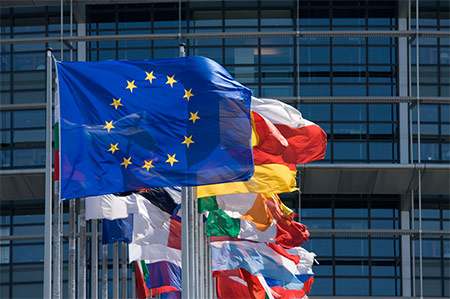External cooperation
With the external financial assistance by the European Commission Directorate-General for Neighbourhood and Enlargement Negotiations (DG NEAR) under the Instrument for Pre-accession Assistance (IPA), ECDC continued to implement the ECDC Action “Preparatory measures for the participation of the Western Balkans and Turkey in the European Centre for Disease Prevention and Control with special focus on One-Health against AMR and enhanced SARI surveillance, 2020–2024” (ECDC-IPA6 project). In response to the COVID-19 pandemic, ECDC set up the Enhanced SARI surveillance (surveillance of acute respiratory infection) to support the implementation of fit-for-purpose surveillance systems, as part of ECDC-IPA6 project. All six beneficiaries in Western Balkans have joined. The network covers all respiratory diseases and is therefore an important tool for future pandemic preparedness. In the framework of this project throughout 2021 national experts from Western Balkans and Turkey participated as observers in 11 ECDC technical network meetings and gathered in the Meeting of National ECDC Correspondents in October 2021 to discuss achievements and agree on the future of ECDC cooperation.

In 2021 ECDC was delivering the work programme 2021 of the EU Initiative on Health Security (HSI), which is a five-year programme to enhance the public health preparedness and response capacities of European Union enlargement and European Neighbourhood Policy (ENP) partner countries, funded by DG NEAR. All fifteen ENP partner countries confirmed their participation. The programme was implemented through three interconnected work packages:
Workforce oriented capability building was delivered through the Mediterranean and Black Sea Programme for Intervention Epidemiology Training (MediPIET). In June 2021, ECDC organised a kick-off meeting with the MediPIET National Focal Points (NFPs) to formally mark the hand-over from the previous implementer of MediPIET, Instituto de Salud Carlos III and Fundación Estatal, Salud, Infancia y Bienestar Social to ECDC. Following a successful start of MediPIET under ECDC management, the 4th Cohort kicked off with 16 fellows representing 11 partner countries. To support Cohort 4, ECDC successfully launched the MediPIET Programme and Coordination space on the ECDC Virtual Academy (EVA), where fellows, supervisors and the MediPIET team work together. November marked the launch of the MediPIET Training Needs Assessment (MTRNA) 2021. This self-assessment is aimed at identifying training needs, methods, and priorities in intervention epidemiology for the partner countries, as well as the region as a whole and will also serve as a basis for a review of the MediPIET core competencies and curriculum. Strong alignment and coordination with the ECDC Fellowship Programme (EPIET/EUPHEM) was facilitated by exchange and collaboration among faculty and joint participation of fellows in most online modules.
Strengthening public health systems and capacities to assess, detect, respond and prevent threats from communicable diseases: ECDC organised two five-day basic trainings on epidemic intelligence and rapid risk assessment, a training on the Epitweetr tool for early detection of public health threats from Twitter data, a joint ECDC/Frontex Regional workshop on the science and practice of entry/exit screening, as well as three-day workshop on after-action and in-action reviews. In total, 90 experts from 14 partner countries participated in the trainings and workshops. To adapt to the local context, ECDC translated several training materials, technical reports and methodologies into languages widely spoken in the region. To engage in a bilateral cooperation with partner countries, become familiar with their public health systems and identify key areas for cooperation, ECDC launched the self-assessment process of public health emergency preparedness and response capacities. The process included data collection from partner countries, bilateral meetings and final reports summarising the main findings and key areas for cooperation within the EU Initiative on Health Security. In total, ECDC produced such reports for nine countries.
Integration into ECDC systems, knowledge sharing and networking: Cooperation with other Centres for Disease Prevention and Control (CDCs) across the globe is amongst ECDC’ priorities since its establishment. Therefore, already in 2007, just two years after ECDC was established, the Agency signed Memoranda of Understanding (MoU) with the US, China, Canada CDCs and in 2012, with Israel. During 2021, collaboration with these MoU partners intensified in the form of bilateral meetings and exchanges of expertise. 2021 marked also as a year of new partnerships with other CDCs. In June, a MoU with the Ministry of Health of Mexico, and in December with the Health Security Agency of the United Kingdom and with the Korea Disease Control and Prevention Agency were signed. Three Memoranda of Understanding signed in one year is a clear and strong signal that ECDC is committed to strengthen and increase collaboration with partners across the globe and join forces to protect the health of the citizens. In addition to these MoU partners, ECDC established bilateral contacts with Australia, India and Japan.
Finally, as a separate action and with external funding from the European Commission, DG INTPA, ECDC started to implement a technical four-year partnership project with Africa CDC entitled “EU for Health Security in Africa: ECDC for Africa CDC”. The overall aim is to contribute to improving health security in Africa, by sharing EU practices and strengthening Africa CDC capacities in preparedness, surveillance and response to health threats posed by communicable diseases. The project inception phase in 2021 aimed to conduct extensive needs assessments, situation analysis and fact-finding activities with Africa CDC in each technical area of the project.